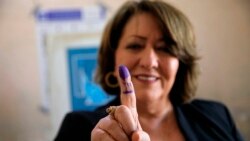The party of cleric Moqtada al-Sadr was the largest vote-getter in Iraqi parliamentary elections, according to initial results released Monday.
A count based on partial results shows the Shiite Muslim cleric has won more than 70 seats in the 329-seat parliament.
Al-Sadr's party said it won 73 seats, increasing its seat count of 54 and giving it a large influence in government formation.
Reuters news agency said former Prime Minister Nouri al-Maliki appeared to have the next largest win among Shiite parties, according to the initial results.
Shiite groups have dominated Iraqi politics since the fall of Sunni leader Saddam Hussein in 2003.
Sunday's vote was marred by a record low turnout for parliamentary elections, at just 41%, according to Iraq's electoral commission. That is below the 44.5% recorded in 2018, the previous all-time low.
The election was held months ahead of schedule in response to youth-led protests against corruption and faltering public services. The protests brought tens of thousands of people onto the streets in late 2019 and early 2020, with demonstrators calling for reforms and new elections.
However, a police crackdown on the protests, which left nearly 600 dead, along with widespread disillusionment about Iraq's political elite led many protesters to later call for a boycott of this year's elections.
Sunday's vote was held under a new law making it easier for independent and reform candidates to be elected, including by making voting districts smaller. In practice, however, powerful parties were still best able to mobilize supporters under the new rules.
The election results are expected to largely maintain the country's traditional political blocs.
However, since no one party won a majority of seats in parliament, negotiations to choose a prime minister to run the government are expected to take weeks or even months.
Some information for this report came from The Associated Press and Reuters.






